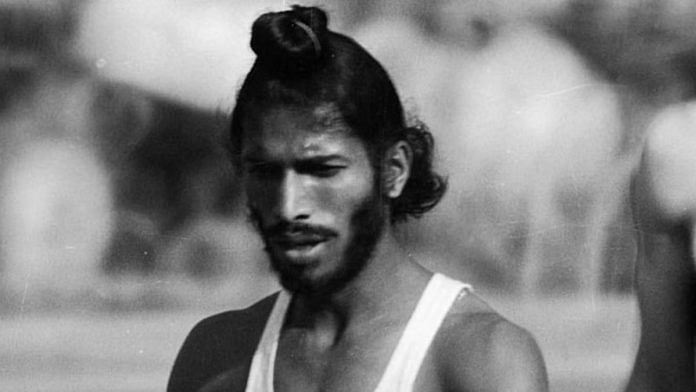Milkha Singh missed winning the bronze medal by 0.1 seconds to come fourth in the 1960 Olympics in Rome. It was one of the most celebrated runs of all time, but it was also the race where he said he committed “the biggest blunder of his career.”
It was the 400 metre race, and for the first 250 metres, Singh was leading the pack. However, he thought he was running too fast and doubted if he would be able to reach the finish line at the same speed. In an attempt to pace himself, he slowed down, but found that he was unable to regain his momentum.
Looking back at the 1960 race, Singh said in an interview to the BBC, “It was bad luck for both India and Milkha Singh.” He often referred to himself in the third person.
The Flying Sikh
But the ‘Flying Sikh’, as he was popularly called, was already a legend. A four-time Asian Games gold medallist, India’s first Commonwealth Games gold medallist and national record holder for over 40 years, Milkha Singh was just short of adding another feather to his cap.
Many experts argue that Singh’s achievement ranks higher than what is mentioned on paper. In 1960, India had only enjoyed independence for 13 years. It lacked the technological facilities and sports infrastructure that other nations had built over the years. At the time, sports was not regarded as a viable and sustainable profession.
The moniker Flying Sikh, which Singh happily embraced, was given to him by former Pakistan president, General Ayub Khan. In fact, in 1960, Singh went to Lahore to take part in a 200-metre event on special invitation from the Pakistani government. After seeing Singh race against Pakistan’s star athlete and national hero, Abdul Khaliq, the General said, “Milkha ji, you didn’t run in Pakistan, you flew. We would like to give you the title of Flying Sikh.”
The celebrated Indian athlete later on said, “So if people know me by that moniker, it’s all because of Pakistan’s generosity.”
However, not many know that he was hesitant to go to Pakistan. It brought back memories of Partition and the untimely death of his parents in the carnage that followed. So, it was only after then prime minister Jawaharlal Nehru personally convinced him that Milkha agreed to accept the invitation from Pakistan.
Singh was born in 1929 in Gobindpura, a village in Kot Addu in Muzaffargarh district in the Punjab province of Pakistan. According to accounts, when the mob descended on his village, Milkha’s father defended them with a sword. As he fell, he yelled to his son, Run Milkha, Run (“Bhaag Milkha bhaag”). These last words would become the title of a 2013 biopic on his life, starring Farhan Akhtar.
Also read: Makhan Singh, the Olympian who defeated Milkha Singh but lived a life of penury
‘Aag thah andar’
Singh discovered his love for running during his time in the Indian Army. Jawans had to undertake a five-mile cross-country run, from where the top ten were selected for further training.
Unfamiliar with what running spikes were or what a tracksuit was, Singh later said he had something that could neither be bought nor taught– “Aag thah andar (I had a fire inside),” he said.
In time, he learned how to fuel that ‘fire’ with dedication and perseverance. In the 1956 Melbourne Olympics, Singh exited in the heats early. However, all was not lost, as a chance encounter with that year’s 400 metre champ, American athlete Charles Jenkins, inspired him to improve his technique. Singh asked for Jenkins’ training schedule, and the latter obliged. He studied Jenkins’ rigorous hill sprints and starting techniques to refine his own training methods.
“I decided unless I beat his record (46.7, hand-timed) I won’t stop,” said Singh. He broke the record two years later in Cuttack, Odisha.
Singh was the first Indian to win a gold at the Commonwealth Games in 1958. It took India 52 years to replicate Singh’s feat and bag a gold medal at the 2010 Commonwealth Games.
Singh passed away on 18 June 2021 after contracting Covid.
When he passed away, his ‘rival’ Abdul Khaliq’s son (Mohammad Ejaz) wrote in his eulogy – “My family will always be in debt to Milkhaji for a great gesture of his. My father was a prisoner of war after the Bangladesh war and was jailed in Meerut. Milkhaji went to meet my father and told the jail officials to take extra care of him.”
In the last page of his autobiography, Singh admitted that the life of a sportsperson was hard. However, he said he took inspiration from an Urdu couplet: “Mita de apni hasti ko agar his martaba chahe, ki dana khak may mil kar gul-e-gulzar hota hai (Destroy your entire existence if you want to reach the zenith, because a seed has to become one with the dust to sprout the blossom into a flower).”
(Edited by Zoya Bhatti)



